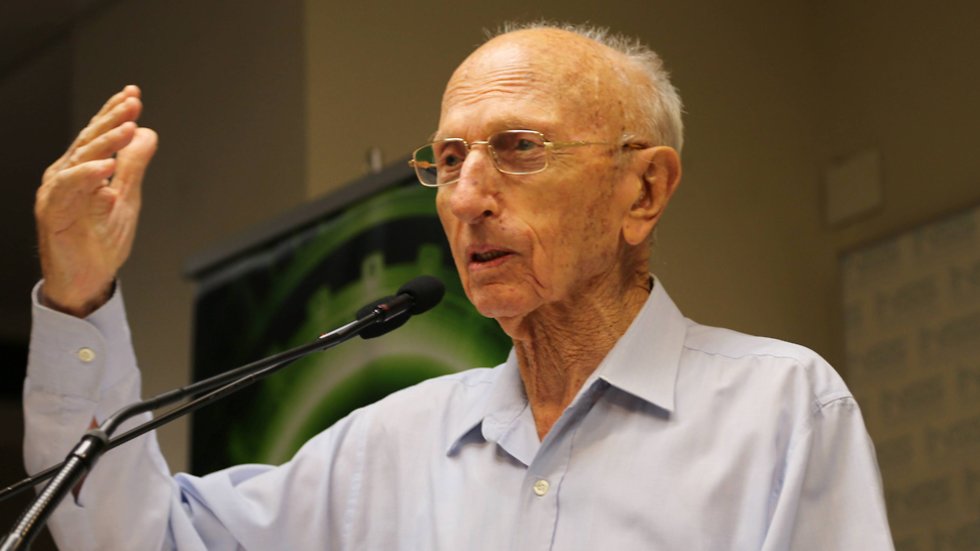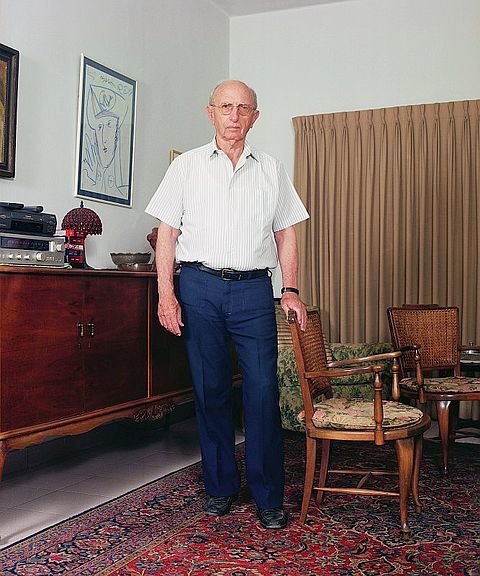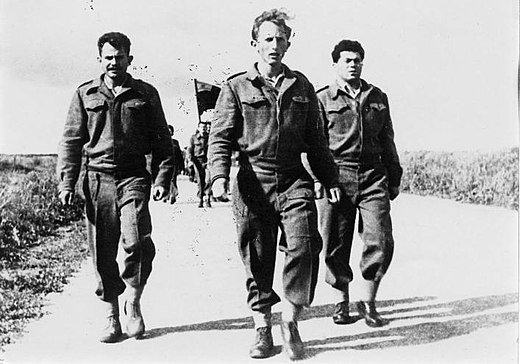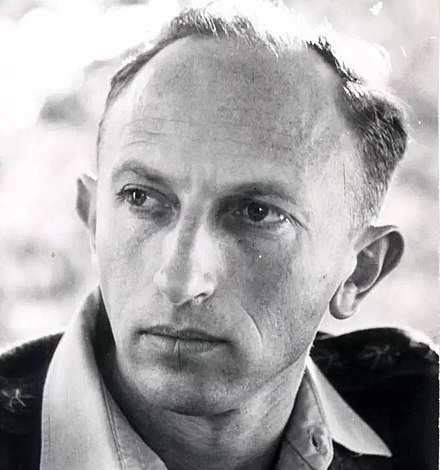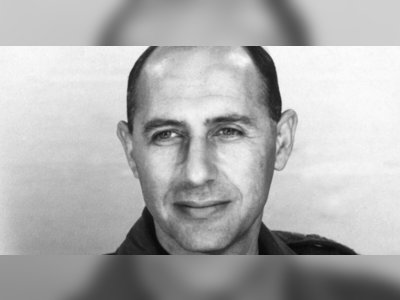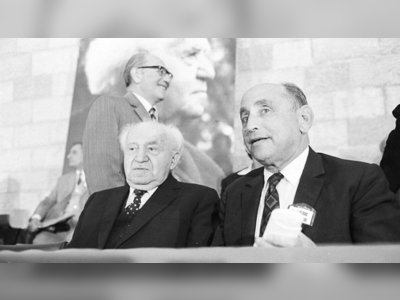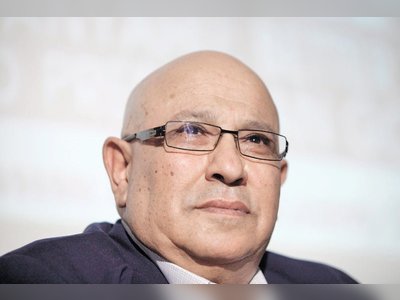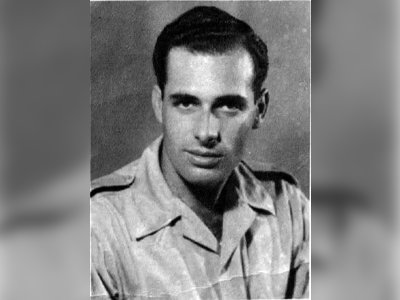Zvi Zamir
Zvi (Zvika) Zamir, born on March 3, 1925, is a former senior figure in the Israeli security establishment. He served as the Aluf (Major General) of the Southern Command from 1962 to 1965 and as the head of the Mossad from 1968 to 1974. He also served as the CEO of Oil Refineries Ltd. from 1976 to 1990.
Early Life and Youth
Zvi Zamir was born in 1925 in Lodz, Poland, to Sarah and Samuel Moshe Zerzavski, a textile industrialist. In the same year, due to an economic crisis in Poland, the family immigrated to the Land of Israel, where Zamir grew up and received his education as a native of the land. The family settled in Tel Aviv, and Zamir attended the "Achdut Ha'Am" school. After moving to the Balfour Street neighborhood, he developed social connections with a group called "Migrash HaMischakim." Subsequently, he joined the Palmach (the strike force of the Haganah).
Palmach Service
In 1942, Zamir enlisted in the Palmach and served in Pluga D (Unit D). In 1944, he participated in the Officers' Training Course alongside Uzi Narkiss and Chaim Bar-Lev. Following the course, he was appointed as the commander of a unit in Eilat Hashachar (Morning Star) of Pluga T (Unit T). In 1946, during the Palmach's activities in smuggling Jews into Palestine from Syria, he was arrested by the British authorities and held in the Latrun detention camp for ten months.
Upon his release, he returned to the ranks of the Palmach and served as a deputy commander and instructor of Pluga Bet (Unit B). At the beginning of the War of Independence, he established the sixth battalion of the Palmach, responsible for securing convoys to Jerusalem, and served as its commander.
Eighteen soldiers from his battalion, along with 17 soldiers from the Jewish Settlement Police (HISH), formed the "Lamed Hey" convoy, and many of them fell while on their way to defend Gush Etzion. Zamir commanded the Nabi Daniel convoy, which was heading to Gush Etzion. When the convoy was ambushed on its way, he ordered all drivers capable of doing so to return to Gush Etzion while he remained with them, leaving command of the convoy in the hands of one of the unit commanders. Under his command, the battalion fought in Operation Danny, Operation Har (The Mountain), and Operation Horev.
IDF Service
In 1949, Zamir was appointed as one of the first instructors in the Officers' School. Following his participation in the course, contrary to orders, at the Palmach Congress, he received a severe reprimand from IDF Chief of Staff Yaakov Dori.
A year later, he served as an instructor in the advanced officers' course. From 1951 to 1953, he commanded the Givati Brigade. In 1953, he went to the United Kingdom to attend the senior command course at the British Army's Camberley Staff College and returned in 1954, where he was appointed as the commander of the Infantry School.
In 1956, he joined the General Staff as a senior commander in the Training Branch, and during Operation Kadesh, he commanded the Carmeli Brigade. In 1957, he went on a study leave to learn geography and history of the Middle East and earned a bachelor's degree in humanities from the Hebrew University of Jerusalem.
In 1960, he was appointed as the head of the Training Department in the General Staff's Branch, and in October 1961, he was promoted to the rank of Aluf (Major General). From 1962 to 1965, he served as the Aluf of the Southern Command during a period marked by infiltration for theft and smuggling. After completing this role, in July 1966, he was sent to the United Kingdom and Scandinavia as an IDF Attaché and head of the Ministry of Defense delegation until 1968. In this capacity, he dealt with the procurement of weapons and equipment for the IDF during the Six-Day War.
The Mossad
On September 1, 1968, Zamir succeeded Meir Amit as the head of the Mossad and served in this position until September 1, 1974. Some of the key events during Zamir's tenure at the Mossad included:
Zamir and the Yom Kippur War
In the year leading up to the Yom Kippur War, Zamir's stance was that there was a possibility of Egypt starting a war against Israel, in contrast to the view of the Aman (Israeli Military Intelligence), which dismissed such a possibility. Among other things, the Mossad obtained information that led to the declaration of "Blue and White Readiness" in May to August 1973.
Approximately 40 hours before the outbreak of the Yom Kippur War, a senior Mossad source, Ashraf Marwan, provided explicit information about Egypt's intention to go to war. In the night between October 4 and 5, Marwan requested to meet with the head of the Mossad for the purpose of discussing the war. Given the uncertainty surrounding this matter in the IDF, this information was considered highly valuable.
Zamir, in his capacity as head of the Mossad, conveyed information about the expected meeting and its purpose to Prime Minister Golda Meir, the Minister of Defense, the Chief of Staff, and other relevant figures. On the night of Yom Kippur, Zamir issued a single unequivocal warning: "Today, a war will break out" to the Prime Minister, Minister of Defense, Chief of Staff, and others.
Later that night, Zamir sent a detailed report on Egypt and Syria's war plan, and at its conclusion, Marwan proposed, with Zamir's endorsement, to "discredit the war's outbreak by publicizing information about it on the radio and in the media, proving to Egypt, including the military command, that the Israelis were aware of the plan and were ready for it."
During the war, Zamir was a member of the Cabinet War Committee established by Prime Minister Golda Meir following the outbreak of hostilities and actively participated in its daily meetings until the end of the war. Zamir accused Eli Zeira, the head of Aman, of intelligence failure before the war and, during a meeting of the heads of the intelligence agencies, claimed that "the most senior intelligence leadership (Aman) turned a blind eye and ignored it."
Following the publication of the Agranat Commission's report, Zamir headed a committee that was asked to propose changes to Israel's intelligence community structure in light of the lessons learned from the Yom Kippur War. Other senior members of the committee included Shlomo Gazit (head of Aman), the head of the Shin Bet, and senior officials from the Prime Minister's Office and the Foreign Ministry.
In 2004, Zamir was heavily criticized for exposing the identity of Israel's top source in Egypt, Ashraf Marwan, which was claimed to have caused significant damage to Israel's ability to recruit agents. Zamir filed a formal complaint with the State Attorney's Office, claiming that the state had harmed his good name by naming him as the source behind the story.
Following a long legal battle, he was exonerated by the State Attorney's Office and the High Court of Justice, which ruled that he had not acted improperly and that his actions were within the framework of his role as head of the Mossad.
Zamir retired from the Mossad in 1974 and has since been involved in various public and private activities. He has also been a vocal advocate for Israeli security and intelligence issues.
Retirement and Later Life
After his retirement from the Mossad, Zvi Zamir became involved in various business and public activities. He served as the CEO of Oil Refineries Ltd. (Bazan) from 1976 to 1990. He also worked in the private sector, including serving as the chairman of the board of directors of the Israeli investment company "Ramat-Gan."
In 1982, Zamir founded the Zvi Zamir Foundation, which is dedicated to promoting and advancing education and research in Israel. The foundation supports various educational and research initiatives, including scholarships for students and funding for academic research projects.
Zvi Zamir has remained an active and respected figure in Israeli society, known for his contributions to the country's security and his commitment to education and research.
Legacy and Impact
Zvi Zamir is best known for his service as the head of the Mossad during a critical period in Israeli history, including the Yom Kippur War. His role in conveying critical intelligence about the impending war and his participation in the Cabinet War Committee during the conflict have been subjects of significant historical interest and debate. Zamir's actions and decisions during this period have left a lasting impact on Israeli intelligence and security policy.
Beyond his role in the Mossad, Zamir's career in the Israel Defense Forces, particularly in the Palmach and later as a senior commander, also contributed to his legacy as a military leader. His dedication to the defense of Israel and his commitment to the country's security have earned him recognition and respect in Israeli society.
Zvi Zamir's post-retirement activities, including his involvement in business and philanthropy, reflect his ongoing commitment to contributing to the well-being and development of Israel.
Please note that the information provided here is based on my knowledge up to September 2021, and there may have been developments or additional information regarding Zvi Zamir's life and activities since that time.
- צבי זמיר – ויקיפדיהhe.wikipedia.org
